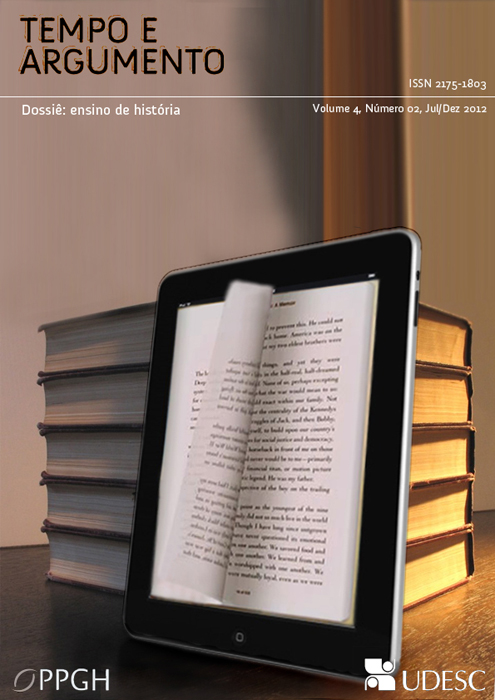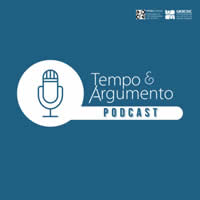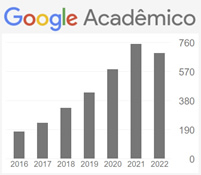History education - some thoughts from the UK: interviews Peter J. Lee
DOI:
https://doi.org/10.5965/2175180304022012216Keywords:
interviewAbstract
The interest in publishing an interview with Professor Peter Lee comes in sync with the wish of bringing toBrazilhis research and reflections on what children and teenagers make of History. Such a wish departs from the presupposition that History teaching in Elementary School will advance little, if any, without History teachers’ and researchers’ serious consideration of learning -- that is, the cognitive processes involved in constructing historical thinking. These processes imply the understanding of what subjects make of historic ideas, and how they construct their perceptions of the past. Through this interview, it is also expected to contribute to the debate on the historical form and function on quotidian life, as it is postulated here (as his discussion also puts forth) that History is a way of thinking and interpreting human existence through time. History is not only an academic discipline, but also a public form of knowledge. Such dimensions articulate and intertwine in different planes, constituting the historical consciousness of both individuals and collectivities. The challenges that emerge here cannot be ignored, particularly those related to the teaching of History in school environments. This is especially true if one believes that teaching History is a powerful tool that enables “readings” of the world, bringing forms of inhabiting and existing in this world to its full potential while articulated to a collective belonging in a project of common futures.
Peter Lee was, until he very recently retired, a senior lecturer in the History Education Unit at the Institute of Education at the University of London. Having taught History in primary and secondary schools, Professor Lee has coordinated several research projects related to History Teaching and Learning, including CHATA (Concepts of History and Teaching Approaches) a project well-known in Brazil. Several of his publications investigate the ideas that children and teenagers have over History in several books, chapters, and articles – many of these with Rosalyn Ashby as co-author. Some of his articles have been translated to Portuguese, circulating among researchers concerned with understanding how children learn History. The questions in this interview have been elaborated so that Peter Lee’s reflections may collaborate with the development of History Teaching and History Education research in Brazil. All contact has been made via e-mail, a rather useful tool that has shortened the distance between Florianópolis and London for a few long moments between July and October 2012.
Downloads
References
DIAMOND, Jared. Armas, Germes e Aço: o destino das sociedades humanas. 9 ed. Rio de Janeiro: Record, 2007.
HALLDEN, Ola. Conceptual change and the learning of history. International Journal of Educational Research, v. 27, n. 3, pp. 201-210, 1997.
LEE, Peter. “Walking backwards into tomorrow”: Historical consciousness and understanding história. International Journal of Historical Learning Teaching and Research, v. 4, n. 1, pp.1-46, January, 2004.
LEE, Peter. Em direção a um conceito de literacia histórica. Educar em Revista. Curitiba, volume especial, n.1, pp.131-150, 2006.
LEE, Peter. Por que aprender História? Educar em Revista. Curitiba, v. 42, n. 4, pp. 19-42, 2011.
LEE, Peter. “Nós fabricamos carros e eles tinham que andar a pé”: compreensão da vida no passado. In: BARCA, Isabel. Educação histórica e museus. Actas das segundas jornadas internacionais de educação histórica. Braga: Universidade do Minho, 2003, pp.9-18.
SHEMILT, Denis. ‘Drinking an Ocean and Pissing a Cupful: How Adolescents Make Sense of History’. In: SYMCOX, Linda.; WILSCHUT, Arie. (Eds), National História Standards —The Problem of the Canon and the Future of Teaching History, volume 5 of the International Review of History Education series, Charlotte NC: Information Age Publishing, 2009, pp.141-209.
Downloads
Published
How to Cite
Issue
Section
License
Copyright (c) 2012 Tempo e Argumento

This work is licensed under a Creative Commons Attribution-NonCommercial 4.0 International License.
The articles published by the magazine are for free use, destined for educational purposes and not commercial. The copyrights are all granted to the magazine. The articles whose authors are identified represent the expressed opinion of its authors and not the official position of the Tempo e Argumento magazine or of the Postgraduate Program in History of the Universidade do Estado de Santa Catarina.




